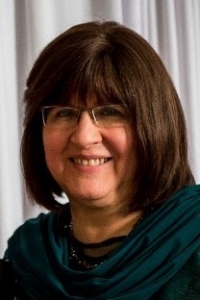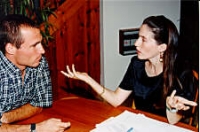
Toby Klein Greenwald
Toby Klein Greenwald, Executive V.P. Creative Development, is a founding partner and the editor-in-chief of WholeFamily. Toby is an educator, journalist, photographer, scriptwriter, poet, playwright, lyricist, and theater director, including for populations that have experienced trauma or are at risk. She is a Playback Theater conductor and is the recipient of Israel's Ministry of Education's Egerest Award for Culture, for her work in educational and community theater. She has more than 30 years of teaching experience and has served on numerous educational think tanks. Her specialties include the creation of innovative educational programs, and teaching Creative Writing and Film to AD(H)D and LD high school students, and to senior citizens. Toby is married to Yaakov and they have six children, most of whom have made her a proud mother-in-law and grandmother.
Text and photos by Toby Klein Greenwald
April 22 is Earth Day. But just the fact that it has a special day designated for it reminds me of how, when we were children, I asked my mother, "Why is there a Mother's Day and a Father's Day, but no Children's Day?" and she replied, "Because every day is Children's Day!"
Every day should be a day in our lives that we walk outside (or at least look out a window!) and appreciate a world with a sky that never gets boring, shades of green as numerous as the stars, rivers and ponds and oceans, mountains and valleys and forests…
And in that thankfulness should be embedded a prayer that the earth and all its components bring us only joy and fruitfulness, never destruction.
What can we do? So much destruction comes from man himself.
In this day and age, when children are glued more than ever to computers and the TV, when more of them have surfed with an iPod than on a wave, how can we reintroduce them to the earth and help them learn to love it?
By binding with them in the process. What you do and how you do it will depend of course on their age.
1. START CLOSE TO HOME. INTRODUCE YOUR CHILDREN TO YOUR GARDEN, or – if you live in an apartment – the grassy park around the corner. Show them how to sink their hands into the dirt and rub it around in their fingers, discovering the rich feeling of soil, little pebbles, the difference in moisture. If they get lucky, they may find an earthworm or two! Help them start a collection of different sizes, shapes and colors of rocks. Let them sink their feet into the soil as well. A friend of mine, a Reiki master, told me once to walk barefoot on grass for relaxation. Do it with your child and relax together
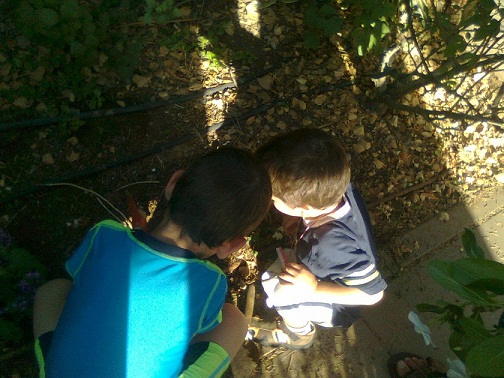
2. SHOW THEM THE SKY AT NIGHT. You may have to drive a little out of your neighborhood, to an area not doused in streetlamps. Point out the constellations. The Greeks were the first to give them names, but ask them what they see in the shapes and patterns. Print out copies of the constellations and have them connect the dots and create pictures from them in their own way. Maybe you'll get luck and see a falling star. Pay a visit to the local planetarium. This can also be quiet time for you to talk about whatever they want to.
3. WALK BAREFOOT ON THE BEACH. Yes, of course we walk barefoot to get to the water, but I mean do it with meaning! Take your child's hand and concentrate on every step. Walk close to the water and watch as it fills in their little footsteps and then washes away the imprint. Sink your hands into the sand and ask them how it feels different from the soil in your garden. Does is pack the same? Fall through their fingers? Walk into the shallow water and stand there with them and feel the pull of the current, the wet sand beneath your feet and around your toes. Collect sea shells with them to add to the shelf, next to the pebble collection. 
4. PLANT WITH THEM. It can be in a window box, or a little patch of garden. Flowers, veggies, whatever is their pleasure. I still remember with fond affection going outside to clip some tomatoes from my father's tomato plants for our dinner, and filling a vase with my mother's roses. In their daily lives, my father was a sales director and my mother managed a cable TV company, but they connected with the earth on the weekends and evenings. What you grow yourself is always more tasty and beautiful to you. Consult with your children about what to plant and let them help you do it. 
5. ENJOY THE SEASONS TOGETHER. In the autumn, jump into the crispy leaves with them before raking them up. In the winter, make snow angels and snow people with them. Freeze some clean snow so you can make snow cones to eat the following summer. Share textures with them throughout the year, for tactile enjoyment – soil, sand, leaves, petals, snow – and translate it into art. For young ones, help them cut snowflakes from folded paper and decorate them with sparkles. Older kids can be introduced to the art of ice sculpture.
6. SHOW THEM HOW TO RECYCLE. Whether water, peels, bottles or last year's outgrown clothes that are donated, share your recycling efforts with them. If your community has personal recycling bins at peoples' homes, let them fill them. If you have to drive to a recycling center, take them with you. Encourage them to think of creative ways to reuse paper, worn down crayons, or that old kitchen pot...er plastic.
7. TEACH THEM ABOUT SUBSTANCES THAT ARE DANGEROUS TO THE EARTH AND ITS CREATURES, like pesticides, aerosols, styrofoam, and other substances that are dangerous to the earth. If they go with you to the supermarket, explain to them why you're choosing organic over regular produce, free-range chickens and eggs, and a paper bag over plastic.

8. MOST OF ALL – LOVE IT YOURSELF. Like with everything in life, children learn the most by personal example. If you are a person who plants, swims, hikes, star-gazes, lies on your back at the beach and looks at the sky, composts or recycles, they will feel your connection to the world in which we live and they will want to love it, too, and they will learn that even if we can't do it all, we do what we can.

Painting by Mike B. Klein
Happy Earth Day!
On family drama, in-laws, and arguments over religion
Photographic models: Yael and Elon Hyman
Background
Ruth and David are a young Jewish couple, married six months, who have moved to Israel, live in city of Ra’anana and are approaching their first Passover together. Ruth teaches English in a secular junior high and Jewish history in an afternoon Hebrew school. David is a software developer. They are faced with a painful dilemma: should they spend the holiday with Ruth’s mother, a widow with no children who also lives in Ra’anana, or should they visit David’s family, thousands of miles away, in Boston? Each wants to be with his own family.
Ruth: David, my students are already talking about Passover vacation. Don’t you think it’s time we talked about what we’re going to do for Passover?
David: There’s nothing to talk about. My parents are expecting us to come to Boston this Passover. It’s been months since I saw my brother and sister, some of the cousins will be there… It's going to be great! And you know how much we love Boston.
Ruth: Hold on, David. I haven’t agreed to anything. My Mom will be all alone and I don’t want to leave her for Passover.
David: But we’re with her all the time.... 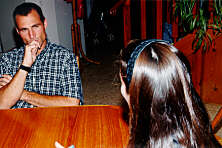
Ruth: Because she has nobody else here. How can I enjoy being with your family on Passover knowing that she’s all alone? Can you understand that?
David: No, I don’t. It’s not fair. Every holiday we'll have to spend with your mother because she's alone. We’re here for the high holidays and on Hanuka we were here the entire holiday and only went to Boston for a week, after it was over. We almost never see my family!
Ruth: Well, maybe we can visit your family some other time - not during the holidays - like during the summer. 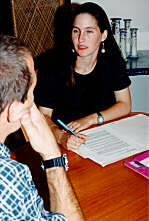
David: You’re a teacher. That’s fine for you. I can’t always get away during the summer, not to mention the huge difference in air fare then! Besides, the whole family’s going to be there this year. You know that only happens on Passover. And it’s so special. You know my Mom. The second she finishes running the synagogue Purim carnival, she starts planning for Passover. It’s like she was born to do Passover. We have a lot of fun and the thought of her food makes my mouth water…You want me to trade that for the two of us and your mother in her one bedroom apartment? It will be a very lonely holiday.
Ruth: David, don’t be so selfish. That’s exactly why she needs us, so it won’t be a lonely holiday for her. Is that all that matters to you - food?
David: Oh come off it and don’t preach to me! Doesn’t she have any friends she can spend it with? Or she can come with us!
Ruth: You know all her close friends spend the holidays with their children, and she’s afraid of flying. I barely got her to Israel, and she swore that it was a one-way trip! What am I supposed to do? Send an elderly woman to a Passover seder with second degree cousins once removed in Tel Aviv she never sees, when I'm right around the corner? 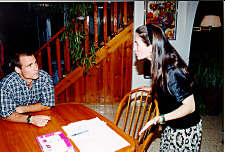
David: She's not that old. She's only sixty-five and she’s not helpless. And the way you fight with her when you’re together, I didn’t know you cared so much. Ruth, I married you, I didn't marry your mother. It’s not fair that I have to be miserable for Passover because you feel guilty about leaving her. She always wanted to join you here but your dad got sick so she only came after he passed away. I’m happy for her and for you that she’s here, but I miss my family. And they’re more traditional in their religious practices, not like your Mom. Come on, Ruth, we’ll have such a great time with them.
Ruth: What does religion have to do with? It’s not her fault she wasn’t raised with more religion. And my lack of religion never bothered you before. When did you get into religion? We talked about this before we came, how moving to Israel didn't mean I'd have to become Orthodox!
David: Look, I don’t want to deal with that issue now. But how about if I speak to my parents about having your Mom come to Boston with us?
Ruth: No, let’s settle this religion issue! I really resent your attitude of superiority! And besides, who are you to talk? Half the relatives at your parents’ table won’t be Jewish! 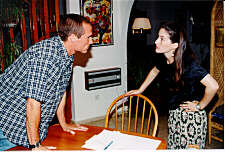
David: Since when are you so holy?
Ruth: Well, since your family grew up with so much tradition, isn’t it surprising that so many intermarried? Your nieces, your cousins…Maybe they’re all rebelling. Maybe that’s what too much religion can do to people!
David: How would you know!
Ruth: David! You are such a hypocrite! I don’t think you even knew I was Jewish when you started to date me!
David: Well, that was only dating…
Ruth: And being more traditional doesn’t make people better people! Look at your sister! She’s a world class witch!
David: Stop it! You’re always coming down on my sister! What did she ever do to you?!
Ruth: She makes me feel like an outsider. And she makes my mother feel like an outsider, too, which is why I wouldn’t ask her to come with us, even if she weren’t afraid of flying.
David: What are you really saying, Ruth? What do you mean you feel like an outsider?
Ruth: I always feel like a non-person when I’m around your family. And it isn’t just because of this religion thing. That’s only an excuse. For you, it's a warm, loving family. You're God to them...
David: What do you mean? My parents are always nice to you.
Ruth: Oh sure, they say all the right things but they’ve never really treated me like one of you. I’m not good enough for you. I’m not from their crowd. They don’t let me forget that it was their money that paid for our wedding.
David: Oh, that’s nonesense!
Ruth: You think that’s nonesense? Let’s face it David -- do you remember how your mother insulted my mother at the wedding when she said, “Oh Ann, what a lovely gown. Did you get it at a discount house?” My mother almost died.
Face it, your family doesn’t like me and I want to be with people who love me, especially at Passover.
David: They never ever said anything bad to me about you.
Ruth: They don’t have to say it, David. I can see it from the look in their eyes, the way they talk to me. They've never accepted me…
David: So I’ve got to be miserable because you think my family can’t stand you...
Ruth: So I’ve got to be miserable? I just knew this would happen one day... 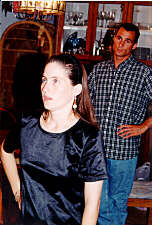
WHERE WILL WE GO FOR PASSOVER? Ruth Comments:
Well, maybe it's just as well that this finally came out in the open. I can't stand being with his family. They treat me like a total outsider and he can't see it! What a way to spend our first Passover together. I wanted it to be so special...
And here's my mom, all alone. On the one hand, I'd be leaving her and she'd be unhappy and on the other hand, it's not even like I'll be enjoying myself. My mom knows the way I feel, so she’s not going to think, “Well, they’re not with me, but at least Ruth’s happy.” What's the point of going? Just so David can spend more time with his family?
He probably thinks that I'm just jealous because their seders are so much more traditional. What right does he have to feel superior? I might have only one brother, and maybe he doesn’t make a big deal about Passover, but at least his wife is the same religion. I resent the way David’s family always make me feel like I’m not good enough, but I don’t want him to feel like I’m taking him away from them. I really love him and want him to be happy. How can we solve this?
WHERE WILL WE GO FOR PASSOVER? David Comments:
I don't know what's going on here! First, she’s all upset about going to my parents' home for Passover because she's worried about her mother, and then what I find out is that she thinks my family hates her. I'm really worried. This is a big problem. I'm real close to them and I feel torn now between Ruth and my folks. I don’t want to lose contact with them, but I really love Ruth and I don’t want her to be unhappy, especially on Passover.
It's really hard for me to believe that they don't like her. I never saw it. And that stuff about money. I don’t remember them raising me with any kind of snobbishness.Maybe she's just envious because I have such a close family and we're all so loving with one another. I know it’s hard for her. Her father is dead and her mother is depressed most of the time.
And what’s her problem with all my non-Jewish relatives all of a sudden? Who is she to talk? She grew up with so little religious practice…
Should I talk to my parents about this? I really don't know what to do. Should I say to them directly: “You know, Ruth thinks that you don't like her?”
I guess I can understand the part about her feeling kind of out of it. We're a real close family and it's sort of hard to break into. Maybe that's why she thinks that they don't like her. But I really look forward to this time of the year. It used to be the time I feel most Jewish. Although it is kind of different now, with so many people at our table who aren’t, but what can I do about that? Anyway, that’s not the main problem here…
WHERE WILL WE GO FOR PASSOVER? Dr. Michael Tobin Comments:

This conflict is definitely not about religion. True, David may want to be more in touch with his family who have stronger Jewish roots than Ruth, but that's not the source of their problem. It's much more universal and "traditional" than that.
One of the first things that a young couple learns is that you don't only marry your partner - you marry a whole system. And David and Ruth are a perfect example of that. The first challenge facing any young couple is separating from their respective families of origin and creating a new family, which is their relationship. That must be their highest priority.
Ruth's not the first daughter-in-law who is convinced her in-laws hate her. It's a rare mother-in-law who doesn't feel a bit resentful toward the strange woman who stole her beloved prince. In this all too familiar family drama, it's David's job to support Ruth and to help her to feel comfortable with his family. To do that he must cultivate a very light and subtle touch. If he's forced to choose between Ruth and his family, then he'll lose everything. If he chooses Ruth, he loses the family. If he chooses the family, he loses Ruth.
So what's the answer?
David said it. He needs to talk to them about Ruth's feelings. Maybe she's right. Maybe they do intensely dislike her. If so, then his loyalty will definitely be put to the test. The more likely scenario, however, is that they don't hate her and were just unaware of having excluded her. They may decide to make extra efforts to make her feel welcome.
If so, this young couple will have passed the first of many marital hurdles.
Wherever you spend it, may your holiday be a joyous one!
Do you experience a subtle thrill of anticipation every time you walk into a darkened theater, groping for your seat, trying not to spill the popcorn and drink in your hand? Movie theaters (note: they are called "theaters"!) still embody a touch of mystery for most people. This feeling is ageless.
In an interview with Toby Klein Greenwald, a happily married couple talks about their marital challenges, conflicts, and successes.
Phil, 41, an insurance agent and Marge, 42, a high school math supervisor have been married 17 years. They have three children, two boys, 15 and 12, and a ten year old daughter. Both are active in church and community affairs and have a lifestyle that moves at the speed of light. The pressure is just too much and they're both about to crack.
One of the greatest challenges facing a couple in a committed relationship is how to keep passion and romance alive. Kids, jobs, the house and the various pressures of life tend to wear down a marriage. The result is a conflict situation like the one confronting Steve (44) and Elizabeth (41).
Ron, 45, a systems analyst and Andrea, 42, an emergency room nurse, are the parents of two teenage boys. Kenny, 16, the oldest, is having trouble in school. Andrea and Ron strongly disagree on how to deal with Kenny. The result is conflict between the couple and most likely, confusion for Kenny.
It may be painful to accept but it's true nevertheless: You don't marry a person --you marry a system. One of the challenges of marriage is learning how to master an essential part of that system--in- laws.
Frank and Linda are in their forties with three children. He's a sales manager of an auto parts company; she markets cosmetics. They fight about money. He wants to save for the future; she wants the good life now. Like many couples, they're stuck in their respective corners.
Dear WholeMom, I have two daughters, aged 17 and 16. Lately they appear not to like each other. The 17-year-old doesn't like her sister's friends and lets it be known and not very nicely. The 16-year-old takes it very personally and fires back in a nasty tone. This is getting worse and now they don't seem to like anything about each other. The younger says she needs to move away for a time to get away from her sister because she "can't take it anymore." I think they should work things out but have run out of ideas. Neither has a nice word to say to the other and life here has gotten miserable for everyone. Moving out is not an option as there is no place to go.
Interactive Features
RealLetters
Learn how to express yourself through letter writing- using proven techniques for creating positive relationships.
Family Soap Opera
Join the Austen-Kutchinskys as they struggle to make their new blended family work.
Real Life Dramas
Listen to others struggle with the marital and child-rearing challenges that stump us all.

